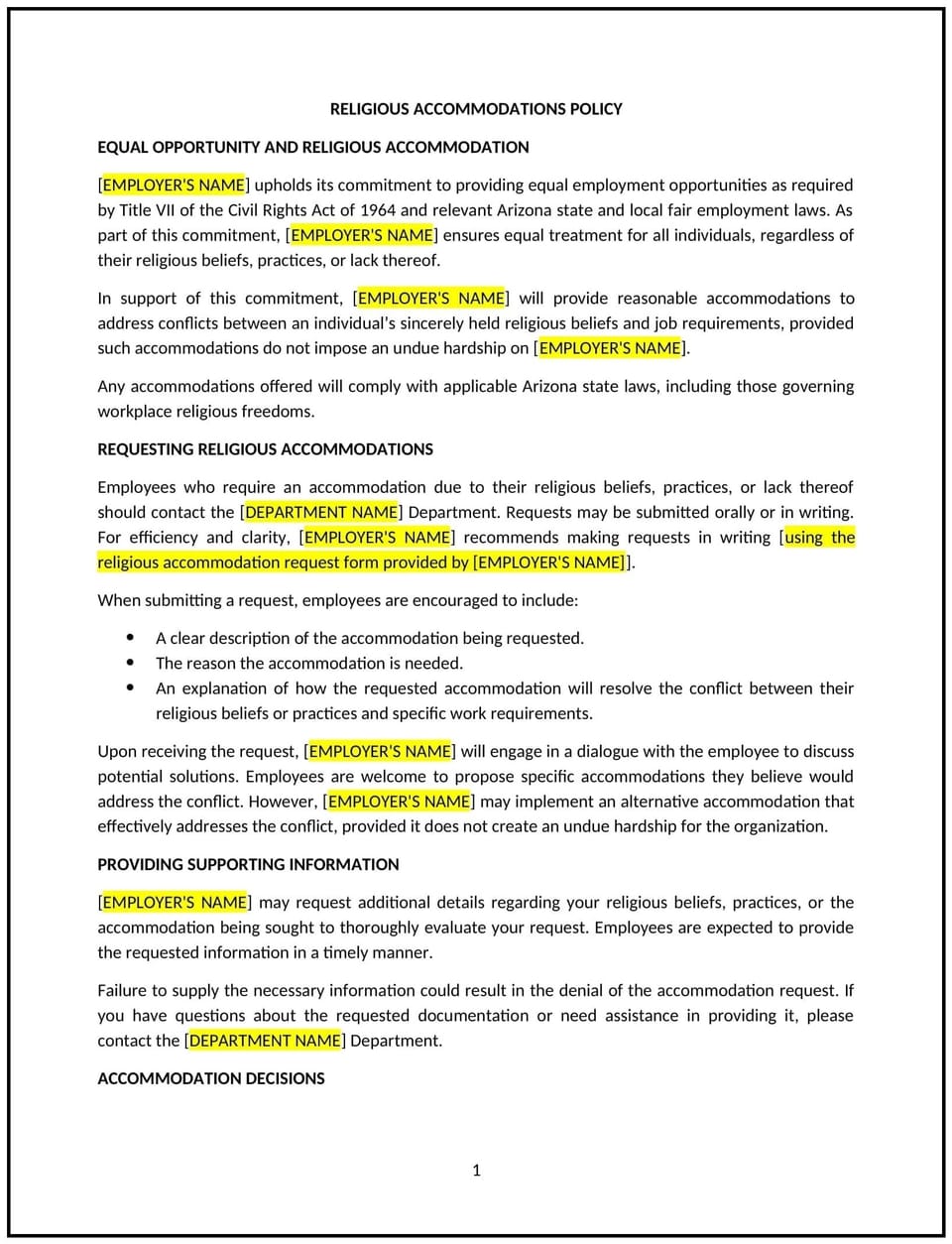Religious accommodations policy (Arizona): Free template

Religious accommodations policy (Arizona)
In Arizona, a religious accommodations policy provides guidelines for businesses to ensure they respect employees' religious beliefs and practices while maintaining a productive work environment. This policy ensures that employees are allowed to observe their religious practices in the workplace without compromising operational needs.
This policy outlines the process for requesting religious accommodations, such as flexible scheduling, dress code exceptions, or time off for religious observances. By implementing this policy, Arizona businesses can foster inclusivity, respect diversity, and comply with state and federal anti-discrimination laws.
How to use this religious accommodations policy (Arizona)
- Define accommodations: Specify the types of accommodations that may be requested, such as modified work hours, shift changes, or adjustments to the dress code or grooming standards.
- Set clear request procedures: Outline how employees can request religious accommodations, including how far in advance they need to submit the request and what documentation, if any, is required.
- Review requests fairly: Ensure that all requests are considered individually and fairly, balancing the needs of the employee with the operational requirements of the business.
- Assess undue hardship: Define the circumstances under which an accommodation request may be denied, such as when it causes significant disruption to the business or imposes undue hardship.
- Communicate expectations: Reinforce that employees must follow workplace policies, but exceptions may be made for legitimate religious practices.
Benefits of using this religious accommodations policy (Arizona)
This policy offers several advantages for Arizona businesses:
- Supports compliance: Ensures the business adheres to the Arizona Fair Employment Practices Act (FEPA) and federal Title VII of the Civil Rights Act, which require employers to accommodate employees’ religious practices unless it causes undue hardship.
- Promotes inclusivity: Demonstrates the company’s commitment to fostering an inclusive workplace where employees feel valued and respected regardless of their religious beliefs.
- Enhances employee satisfaction: By accommodating religious practices, businesses can improve employee morale and reduce turnover.
- Reduces legal risks: A clear and consistent approach to religious accommodations can minimize the risk of discrimination claims or lawsuits.
- Encourages diversity: Supports a diverse workforce by recognizing and respecting the varied religious practices of employees.
Tips for using this religious accommodations policy (Arizona)
- Address Arizona-specific considerations: Be mindful of local religious observances or practices that may be more prevalent in your workforce.
- Maintain open communication: Ensure that managers and employees have open lines of communication to discuss accommodation needs and any potential challenges.
- Train managers: Provide training on how to handle accommodation requests and ensure compliance with the policy.
- Review requests promptly: Ensure that accommodation requests are processed efficiently to avoid delays or dissatisfaction.
- Document requests: Keep thorough records of accommodation requests and any steps taken to ensure transparency and legal compliance.
Q: How do employees request religious accommodations?
A: Employees should submit a formal request to HR or their manager, specifying their religious needs and, if necessary, providing supporting documentation.
Q: What types of religious accommodations can employees request?
A: Employees may request changes to their work schedule, dress code, time off for religious holidays, or other adjustments that align with their religious practices.
Q: Can religious accommodation requests be denied?
A: Accommodation requests may only be denied if granting the request would cause undue hardship for the business, such as significant disruption to operations or excessive costs.
Q: How does the company assess undue hardship?
A: Undue hardship is assessed by considering factors such as the nature of the business, the cost of the accommodation, and the impact on other employees and operations.
Q: How does this policy support compliance with Arizona and federal laws?
A: The policy aligns with Arizona and federal laws, ensuring employees' religious practices are respected without violating anti-discrimination regulations.
This article contains general legal information and does not contain legal advice. Cobrief is not a law firm or a substitute for an attorney or law firm. The law is complex and changes often. For legal advice, please ask a lawyer.


